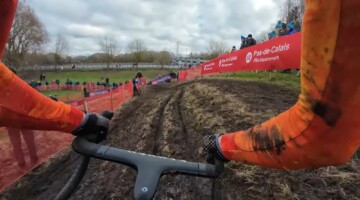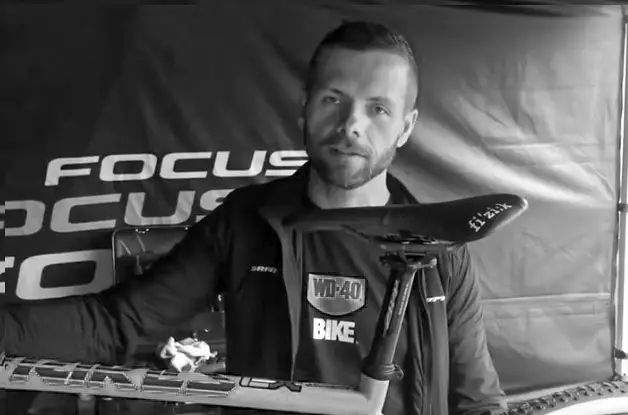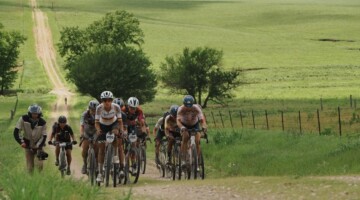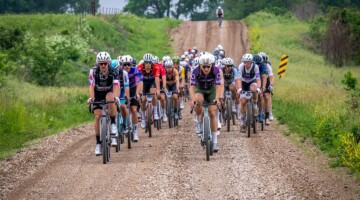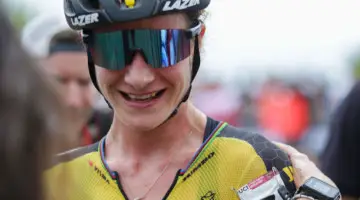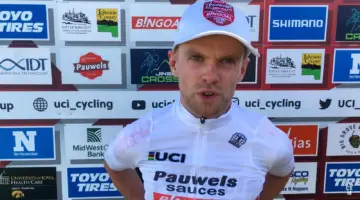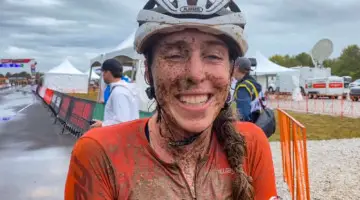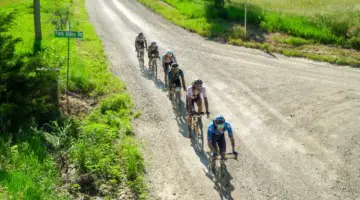When I talked to Spencer Petrov last month, he made sure to thank the Aspire Racing team mechanics for all the work they do behind the scenes. Tom Hopper is well-known thanks to his Mechanic’s Nationals success, and Brandon Davis of Wilmington, N.C. joined him the past few seasons.
Davis’ name might be familiar for regular Cyclocross Magazine readers this past season. A bit of a cycling renaissance man, Davis chipped in his mechanical knowledge for our Ask the Mechanics pieces on chain maintenance and all things cables, and he also added his coaching know-how for our Ask the Coaches on training for Nationals. (I guess we do a lot of asking around these parts!)
Davis first got involved in the pro mechanic scene by volunteering to help Hopper out at the 2015 Boulder Nationals—it did not hurt that Hopper is his cousin—and then started full-time with the growing Aspire team the following season. This past season, he took on full-time duties as Ellen Noble’s mechanic.
When he’s not on the road as a wrench, Davis runs a coaching business called Wattage Cottage where he primarily works with cyclocross and mountain bike riders. Part II of our conversation will be a future Training Tuesday where I … asked him a bunch of questions about cycling coaching and training.
Today’s conversation focuses on Davis’ role as a professional cyclocross mechanic. He said his future is up in the air after Aspire folded, but he said if he does find a new gig, it will be a lot of rewarding work, but if he doesn’t, he will definitely miss being a part of the U.S. UCI cyclocross scene.
Life on the Road
What does life on the road entail for a pro mechanic? A lot of driving and planning. “You’re not gone for a few days,” he said. “The past three seasons I’m gone from the end of August, sometime around the 25th until the first week of October. I’m on the road and at the races. I’m not home for one single day. So for a like six-week stint, that’s a big ask.”
He said with the way the U.S. ’cross schedule is set up, the first month is, as expected, crazy for support staff. “The opening rounds, the World Cups the past few seasons and the first blast of races; with our sprinter and trailer setup, that was my home,” he said. “I was in charge of getting that equipment all over the U.S. Managing that time traveling and figuring out routes. You have DOT to deal with, so it’s not like you can just blast out a 13-hour day and hang out in the next city. You’re limited by drive time. That takes strategy to get to and from these races.”
The work on the road during those months is not confined to driving and races. There are also the creative makeshift bike shops. “When I’m on the road, I’m also gluing tires. I do maintenance on the road. Especially in September, there was a lot of bike building in Holiday Inn parking lots.”
Two years ago, the CrossVegas-Jingle Cross World Cup combination created logistical challenges for both European and U.S. teams. “I think it was the season before when they had the Iowa World Cup in September and Vegas, and they were like two days apart,” Davis said. “There was some crazy logistical nightmare. It was like three days to do four days of driving, legally.”
Davis said Aspire and other teams had to call in some pinch drivers to make it work. “The people who really pushed that envelope were forced to hire another driver. Luckily our manager Molly’s partner Peter was able to come down and help out with driving. We were literally on a 24-hour rotation the first day. That’s just managing equipment, let alone all the other stuff like dealing with the racers’ most important day if they’re peaking for a certain race. Typically September was a hot month because Jeremy wanted to do well in Vegas and the opening World Cups to set up his points. As did Ellen when she came on. That was usually the most stressful part of the season.”
Psychologist More Than Wrench
The pressure on professional mechanics is incredibly high thanks to constantly have athletes’ bikes perfectly dialed and make quick changes in tires and other equipment. That pressure is doubly high in cyclocross, where the stress put on equipment is on another level.
Davis said despite that, the biggest challenge is not necessarily the wrenching, although it does help to have an attention to detail.
“You’re much more a psychologist,” he said. “The mechanic part of being a pro mechanic is pretty easy. If you’re a decent shop wrench; if you can take the biggest piece of crap in the shop and make it shift and roll smoothly, that’s far harder than dealing with the best equipment that’s constantly maintained. The actual mechanic work is pretty easy if you’re a decent mechanic. It’s all the other management that’s the hard part. Being extremely detail-oriented is super important. You may be able to get away with leaving a cable end not quite crimped solid enough on a shop bike, but if that’s you, don’t get into being a pro mechanic. Everything has to be super-dialed, and you need an attention to detail.”
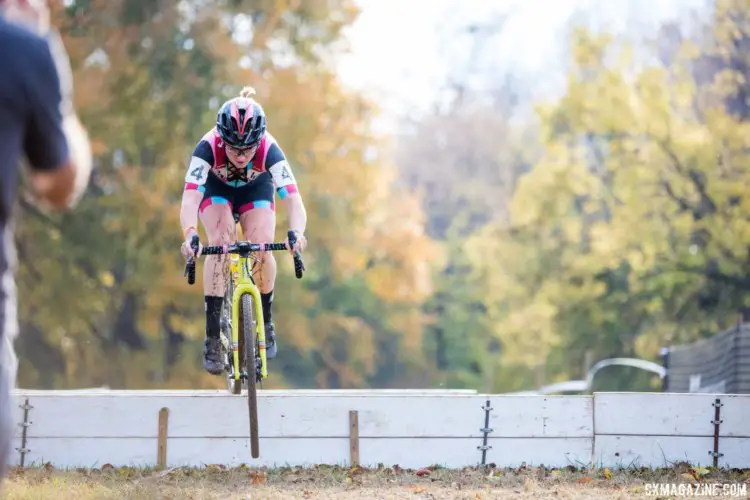
Davis helped Ellen Noble get her bikes dialed in during the past season. 2017 Pan-American Championships. © D. Perker / Cyclocross Magazine
He elaborated on what some of the wrench psychology entails. “Figuring out what stressors they have, with any athlete,” Davis said about working with athletes. “This speaks to a mechanic-athlete relationship as much as it does a coach-athlete relationship. Figuring out where they unnecessarily pour energy and trying to mitigate that. For instance if the athlete has a tic where they’re constantly wanting to adjust something, rather than fight that and say, ‘I just torqued that, and it’s dead-on like all your other bikes,’ it’s good to just let them do that because it may be their outlet for some nervous energy.”
“Figuring out things like that. Is this a nervous a tic that they need to happen, or is it them testing you or vice versa. Mitigating unnecessary energy, or allowing unnecessary energy to be spent for the greater good of their mental head space.”
“You’re much more a psychologist.” – Brandon Davis
Davis started working with Noble midway through the 2016/17 season, and this past year, he worked with her full-time. He said building a relationship between mechanic and athlete is rewarding, but it definitely takes years more than months to perfect. “The first season is like a new relationship. You’re learning that person, they’re learning you. You’re learning how to communicate, essentially. The honeymoon period, if you will, was that first season, and then this year, we came into the fold really clicking and ready to attack the races. I would have loved to have a few more seasons working with Ellen to see how we could have evolved together. I feel like this year was a really good year, but I can’t really speak to that relationship too too much because I feel like we were just getting in there.”
Davis shared much more about working with Aspire and building relationships with the team’s athletes. He also shared a bit of Pit Confidential about what things the Aspire athletes were most particular about on their bikes. Stay tuned, obviously, to see if the Pit Confidential becomes a regular feature here at Cyclocross Magazine.
Interview with Brandon Davis, Pro Cyclocross Mechanic
My full conversation with Brandon Davis about being a pro mechanic is available via the embed above, our Soundcloud page and now, iTunes. For more podcast-style interviews with Spencer Petrov, Jen Malik and Amanda Nauman, see our Audio File archives.


